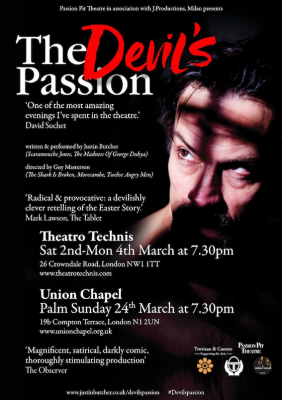Play: The Devil's Passion

Justin Butcher's profoundly moving The Devil's Passion returns to north London this weekend with performances at Theatre Technis in Camden and one show later in the month at the Union Chapel in Islington.
With a nod to Paradise Lost, and under a swaying banner of a winged serpent bearing the Legend 'Non serviam', a debonair Satan casts himself as leader of the 'free world' against fanatical enemies of freedom, in thrall to a 'stagnant tyranny of mindless orthodoxy' and an autocratic deity. The topical satire is delicious.
Satan boasts that, within the next hour, 'The notorious radical preacher and populist demagogue Y'shua Bar-Yessuf - the man known, by way of shorthand to our operatives, as Jesus' - will be taken, dead or alive.
Butcher plays not only Satan but also every other part in this inspired left-field Passion. I was thrilled and moved by his physical and vocal range, energy and the beautifully conceived and composed narrative: a range of story-telling and re-enactment.
Throughout, Butcher alternates between wholeheartedly inhabiting each role he plays and intersplicing the narrative with ironic and mocking asides from himself as envious Lucifer. Not for him the 'flatulent pomposity of voices in polyphony - William Byrd, Orlando Gibbons and Thomas bloody Tallis farting peace and praise in forty-part motets' (a hilarious echo of Milton's 'warbled hallelujahs'). Concerning Christ's Palm Sunday entry into Jerusalem, he says: 'See where he rides now, Y'shua Bar-Yessuf, Jesus the young Lord God Himself, riding up the royal road to the Holy City on a donkey - ostentatiously humble, as always.' He also plays the donkey to great comic effect. 'Welcome to Jerusalem, Son of David, the charnel-house of history! And the whirligig of time traces the battle-paths of invaders, Saracens, Babylonians, Romans, Crusaders, and whizzes by the Wailing Wall, the Dome of the Rock, and the Church of the Holy Sepulchre. So, just say the word, your majesty, and I'll turn into a warhorse, an armoured car or a Merkava Mark 4 tank, and then we'll have some fun. Hee-haw!' Butcher embraces anachronism in the best traditions of the medieval mysteries and Shakespeare where past and present mutually inform each other and interfuse in salvation chronology.
The story begins with Mary's joyful conception: 'The door of life opens within her. God and human essence fuse. A fragile germ conceived. The first gate falls. The enemy enters in.'
Butcher's 'falling gates' leitmotif - falling gates of flesh, victims, shame, mammon, enmity, piety, fear, etc - proves an inspired and gripping engagement with the Harrowing of Hell tradition of Holy Saturday, derived from the Gospel of Nicodemus, which recounts how Christ descended into Hell and freed those within - as notably performed in the York Mysteries passion pageant. Psalm 24 (Atollite portas) was sung in remembrance of Jesus passing through Hell's gates: 'Lift up your heads, open up ancient doors, let the King of Glory enter.'
The shapeshifting Prince of Lies re-enacts the Temptation in the Wilderness in which he plays a scrawny vulture, a chirruping cricket and a beguiling 'still, small voice' - lovely, powerful and precise physicalisation complements the writerly range and brings all manner of thought-provoking resonances.
An unctuous tour guide, and worldly Chief Priest are other comic tours de force, and Butcher excels in appealing to our compassion and humanity, not least with his self-harming Gerasene demoniac and 'unclean' menstruating woman 'with the issue of blood'. With superb physicalisation and eye-work, he is getting to the heart of the matter. Christ's connection with the outcasts and outgroups, 'the falling of gates', is the unequivocal Gospel message of bridge-building Love and Justice. The woman's stretching to 'but touch' the hem of Jesus's garment is a tableau evocative of Michelangelo's digital connection between God and Adam.
Similarly, a 'perfectly repugnant little reptile named Zacchaeus' - the turncoat collaborator tax collector - comes out radicalised after Jesus tells him the parable of Dives and Lazarus. It ends, mystery cycle-like, with a challenge to the audience:
'How is it,
That Lazarus today is still not free?
How comes it that he lies still at your gate?
Will you release him from his wretched fate?
How many more millennia must he wait?'
In similar vein, Satan addresses the 'none-too perky-looking' Jesus suffering on the cross, predicting that his death will all be for nought in a harangue inspired directly by Dario Fo's Mistero Buffo. 'By the time they're done, they'll make you into the prettiest wee manikin that ever graced a pulpit panel! ... Then this cross of yours - they'll have it marching at the head of armies, summoning men to come and spill each other's guts in the sand.'
Butcher is forensic in his identification of the appalling misuse of religion, whether in ostentatious piety or in war.
Mary, however, is present at the foot of the cross to counter Satan's cynicism. 'This sight that pierces my heart, this senseless, unjust, lunatic sacrifice, my own son bleeding the hurts of the world, will tear open the heavens and bring Paradise down at last to the dying earth.'
No ghastly substitutionary atonement this but a profound meditation on Christ's Gospel of Love and Solidarity, enacted with a deceptive directness and simplicity which conceals its great theological and dramaturgical depths. The Devil's Passion is a coup de théâtre. I urge you to see it.
The Devil's Passion is at Theatre Technis, 26 Crowndale Road, London NW1 1TT Camden from 2 - 4 March www.theatrotechnis.com
And the Union Chapel 19b Compton Terrace, London N1 2UN on 24 March at 7.30pm see: www.unionchapel.org.


















